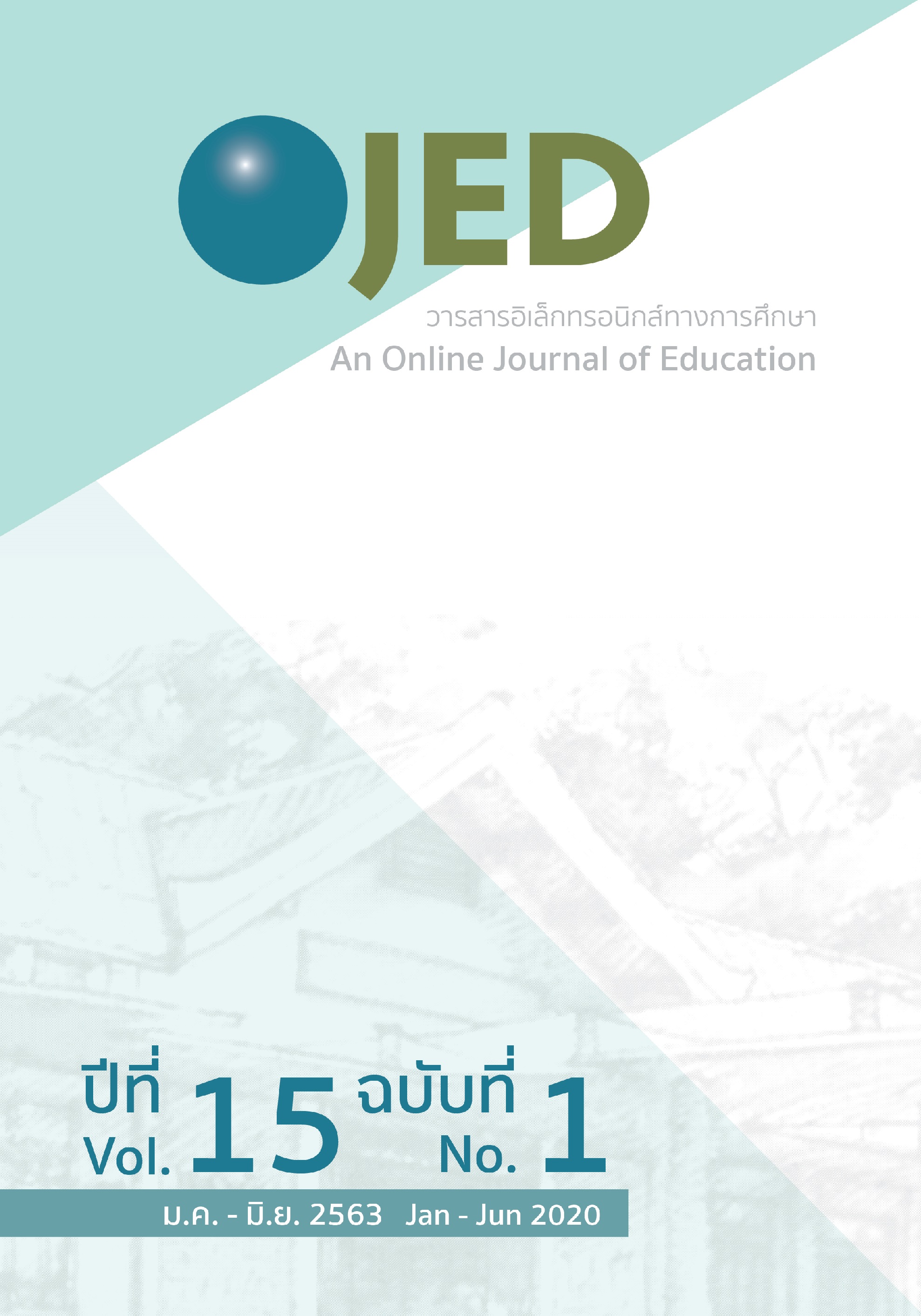Effects of STEM Education Using Engineering Design Process on Problem Solving Ability of Elementary Students
DOI:
https://doi.org/10.14456/ojed.2020.3Keywords:
สะเต็มศึกษาโดยใช้กระบวนการออกแบบเชิงวิศวกรรม, เทคนิคการใช้คำถาม, ความสามารถในการแก้ปัญหาAbstract
The purposes of this research were 1) to compare the problem-solving ability of grade 3 students before and after the experiment was carried out with the experimental group 2) to compare the problem-solving ability of grade 3 students before and after the experiment was carried out with the control group, and 3) to compare differences in the abilities of the experimental group and the control group of grade 3 students to solve problems. The subjects were third grade students of a public school. There were 25 students in the experimental group and another 25 students in the control group. The research instruments were STEM educational activities using engineering design process, including questioning technique plans, and STEM educational activity using engineering plans. The data-collection instruments were the pre-test and post-test of problem-solving ability. The collected data were analyzed by mean, standard deviation, and t-test.
The results of the study showed that 1) the problem-solving abilities of the students in the experimental group were higher than the students in the control group at a .05 level of significance; 2) the problem-solving abilities of the students in the experimental group were higher after the experiment at a .05 level of significance; and 3) the problem-solving abilities of students in the experiment group and the control group were not different
References
กระทรวงศึกษาธิการ. (2552). หลักสูตรแกนกลางการศึกษาขั้นพื้นฐาน พุทธศักราช 2551. โรงพิมพ์ชุมนุมสหกรณ์การเกษตรแห่งประเทศไทย.
พรภัทร สินดี. (2557). ผลการจัดการเรียนรู้แบบบูรณาการเชิงวิธีการที่เน้นกระบวนการกลุ่มที่มีต่อผลสัมฤทธิ์ทางการเรียนวิชาคณิตศาสตร์ ความสามารถในการสื่อสารทางคณิตศาสตร์และพฤติกรรมการทำงานกลุ่ม เรื่องลำดับอนุกรม ของนักเรียนชั้นมัธยมศึกษาปีที่ 5 [วิทยานิพนธ์ปริญญามหาบัณฑิต]. Srinakharinwirot University Institutional Repository. http://ir.swu.ac.th/xmlui/bitstream/handle/123456789/4460/Pornpat_S.pdf?sequence=1
พรรณพร นามโนรินทร์. (2554). การพัฒนาทักษะการแก้ปัญหาจากการจัดการเรียนรู้โดยใช้ปัญหาเป็นฐาน (Problem-Based Learning) ของนักเรียนชั้นประถมศึกษาปีที่ 4 โรงเรียนบ้านหนองโก สำนักงานเขตพื้นที่การศึกษาประถมศึกษามหาสารคาม เขต 3. วารสารศึกษาศาสตร์ มหาวิทยาลัยบูรพา, 6(1). 87-94.
พัชราพร มิญชรัตน์. (2557). ผลการจัดการเรียนรู้แบบใช้ปัญหาเป็นฐานร่วมกับเทคนิค STAD ที่มีต่อสมรรถนะด้านการแก้ปัญหาแบบร่วมมือเรื่อง พันธะเคมีของนักเรียนชั้นมัธยมศึกษาปีที่ 4 [วิทยานิพนธ์ปริญญามหาบัณฑิต, ไม่ได้ตีพิมพ์]. มหาวิทยาลัยนเรศวร, พิษณุโลก.
วศิณีส์ อิศรเสนา ณ อยุธยา. (2560). เรื่องน่ารู้เกี่ยวกับ STEM Education (สะเต็มศึกษา). สำนักพิมพ์แห่งจุฬาลงกรณ์มหาวิยาลัย.
สถาบันส่งเสริมการสอนวิทยาศาสตร์และเทคโนโลยี. (2557). สะเต็มศึกษา. https://www.stemedthailand.org/?page_id=23
อภิสิทธิ์ ธงไชย. (2556). สะเต็มศึกษากับการพัฒนาการศึกษาวิทยาศาสตร์ เทคโนโลยีวิศวกรรมศาสตร์และคณิตศาสตร์ในประเทศสหรัฐอเมริกา. สมาคมครูวิทยาศาสตร์ คณิตศาสตร์และเทคโนโลยีแห่งประเทศไทย, 19(1), 15-18.
อาทิตย์ ฉิมกุล. (2559). ผลของการจัดการเรียนรู้ชีววิทยาตามแนวคิดสะเต็มศึกษาที่มีต่อความสามารถในการแก้ปัญหาและผลสัมฤทธิ์ทางการเรียนชีววิทยาของนักเรียนระดับชั้นมัธยมศึกษาตอนปลาย [วิทยานิพนธ์ปริญญามหาบัณฑิต]. Chulalongkorn University Intellectual Repository (CUIR). http://cuir.car.chula.ac.th/bitstream/123456789/55146/1/5783457927.pdf
Carin, A. A., & Sund, R. B. (1971). Developing questioning techniques: A self-concept approach. Bell and Howell.
Glen, R. (1997). Scamper for student creativity. Education Digest, 62(6), 67-68.
Omairah, O. (2009). Teacher’ questioning techniques and their potential in heightening pupils’ inquiry. https://www.eduhk.hk/primaryed/eproceedings/fullpaper/RN354a.pdf
The Partnership for 21st Century Skills. (2008). 21st century skills, education & competitiveness: A resource and policy guide. http://www.21stcenturyskills.org/documents/21st_century_skills_education_and_competitiveness_guide.pdf
Robert, A. (2013). STEM is here. Now what? Technology and engineering teacher, 73(1), 22-27. https://eric.ed.gov/?id=EJ1049206
Tobin, T. (1980). Ten principle for knowledge management success. Gartner.
Turney, C. E., Eltis, K. J., & Hatton, N. (1987). Sydney Micro Skills: Redeveloped Series 1 handbook: Reinforcement, Basic Questioning, Variabillyity. Sydney University Press.
The Integrated Mathematics Science and Technology. (2007). Research Project Integrated Mathematics Science and Technology in the Middle Grades. http://www.fcrstem.org/Uploads/1/docs/IMAST.pdf
Downloads
Published
How to Cite
Issue
Section
License
Copyright (c) 2020 An Online Journal of Education

This work is licensed under a Creative Commons Attribution-NonCommercial-NoDerivatives 4.0 International License.




